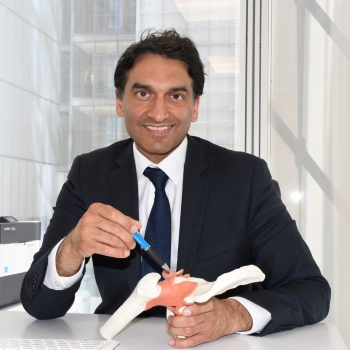
ORTHOPAEDIC OPINIONS BLOG
How do Orthopaedic Surgeons and Physiotherapists work together?
September 2023

Mr Vipin Asopa
Specialist Consultant Hip and Knee Surgeon

Marco Bevellino
Physiotherapist & Clinical Lead, Q Sports Physio
Orthopaedic surgeons are dedicated medical professionals specialising in the diagnosis and treatment of a wide range of issues concerning our musculoskeletal system. This includes bones, joints, ligaments, tendons, and muscles.
This blog explores the diverse treatment options available to patients, with a particular focus on physiotherapy in facilitating recovery and improving overall quality of life.
UNDERSTANDING ORTHOPAEDIC TREATMENT OPTIONS
When you seek the expertise of an orthopaedic surgeon, they carefully assess your condition, taking into account factors such as your overall health and the severity of pain or injury. Treatment options can vary and may include:
- Pain Management: Managing pain is a top priority, and various approaches, including medications and therapies, can be recommended to alleviate discomfort.
- Lifestyle Modifications: Simple adjustments to your daily activities or habits can often make a significant difference in your recovery.
- Mobility Aids: Devices like walking aids may be prescribed to increase mobility and provide support during the healing process.
- Injections: Some patients may benefit from injections to reduce inflammation and pain.
- Physiotherapy: Physiotherapy plays a key role in rehabilitation and recovery, addressing both acute and chronic conditions.
- Surgery: When conservative measures are insufficient, surgical intervention may be necessary to restore function and alleviate pain.
- Waiting: In some cases, a patient’s condition may resolve on its own, and no immediate intervention is required.
THE ROLE OF PHYSIOTHERAPY
Physiotherapy, an integral component of orthopaedic care, focuses on restoring movement and function for individuals affected by injury, illness, or disability. It adopts a holistic approach, actively involving patients in their own healing journey. It can be used as the only treatment or in conjunction with surgery; physiotherapy offers several key benefits:
- Comprehensive Care: Physiotherapy can be the primary treatment modality or complement surgical interventions, ensuring a well-rounded approach.
- Pre-Surgery Preparation: In some cases, physiotherapy is recommended before surgery to optimise a patient’s condition and improve postoperative outcomes.
- Rehabilitation: After surgery, an extensive physiotherapy rehabilitation plan may be initiated to facilitate a full recovery, often tailored to specific goals such as returning to sports activities.
COLLABORATION FOR SUCCESS
Orthopaedic surgeons and physiotherapists work collaboratively to provide the best possible care for patients. The process involves:
- Initial Consultation: During your first visit to a physiotherapist, a thorough assessment of your injury or condition is conducted, and a personalised treatment plan is developed.
- Ongoing Communication: Regular updates between your surgeon and physiotherapist ensure that your recovery stays on track and adjustments are made as needed.
- Post-Surgery Follow-up: Orthopaedic surgeons schedule follow-up appointments, typically at two weeks and six weeks post-surgery, to monitor progress and make informed decisions regarding your treatment.
- Multi-Disciplinary Care: In complex cases, patient care may involve a team of specialists, such as sports doctors, nutritionists, and psychologists, all working together to achieve the best possible recovery outcomes.
IN CONCLUSION
Orthopaedic surgeons and physiotherapists are key players in helping individuals regain their mobility and quality of life. By tailoring treatment plans to individual needs and leveraging the power of physiotherapy, patients can look forward to a brighter, pain-free future.
For more information, refer to reputable sources such as WebMD and the NHS.

Marco Bevellino, Physiotherapist & Clinical Lead, Q Sports Physio
Marco is a Physiotherapist at Q Sports Physio, who’s clinics are located in Kew, Moorgate and Gunnersbury Park. He helps many clients who have been struggling with pain or injuries. Marco has a special interest in sports injuries, lower limb injuries and walking/gait analysis.
To book an appointment with Marco, contact Q Sports Physio here:
Call: 020 8287 1962 | Book Online: https://online.tm2app.com/qphysio